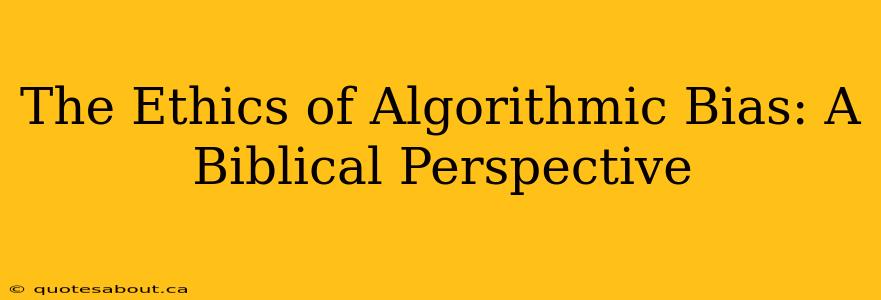The rise of artificial intelligence (AI) and its pervasive algorithms has ushered in a new era of technological advancement. However, this progress is not without its ethical challenges. Algorithmic bias, where algorithms perpetuate and even amplify existing societal prejudices, is a significant concern. This article explores the ethics of algorithmic bias through the lens of biblical principles, offering a framework for responsible AI development and deployment.
What is Algorithmic Bias?
Algorithmic bias refers to systematic and repeatable errors in a computer system that create unfair outcomes, such as discriminatory lending practices or biased facial recognition software. This bias isn't necessarily intentional; it often stems from biased data used to train the algorithms. If an algorithm is trained on data reflecting historical societal biases—like gender or racial disparities in hiring practices—it will likely reproduce and even exacerbate those biases in its output. The consequences can be far-reaching, impacting individuals' access to opportunities, justice, and even their safety.
How Does the Bible Address Fairness and Justice?
The Bible consistently emphasizes fairness, justice, and compassion. Leviticus 19:15 states, "Do not pervert justice; do not show partiality to the poor or favoritism to the great, but judge your neighbor fairly." This verse directly addresses the core issue of algorithmic bias: impartiality in judgment. Algorithms, designed to automate decision-making, must be held to the same standard of fairness and justice as human judges. Bias in algorithms directly contradicts this biblical principle.
Are AI Algorithms inherently biased?
This is a common question, and the answer is nuanced. AI algorithms are not inherently biased; they are tools, and like any tool, they can be used for good or ill. The bias arises from the data they are trained on and the choices made by their developers. If the data reflects existing societal biases, the algorithm will likely learn and perpetuate them. Therefore, the responsibility lies with developers to ensure data quality, address potential biases in the datasets, and rigorously test algorithms for fairness before deployment.
How Can We Mitigate Algorithmic Bias from a Biblical Perspective?
Mitigating algorithmic bias requires a multi-faceted approach informed by biblical principles:
-
Transparency and Accountability: Proverbs 11:3 states, "The integrity of the upright guides them, but the unfaithful are destroyed by their duplicity." Transparency in the development and deployment of algorithms is crucial. Understanding how an algorithm works and the data it uses allows for identification and correction of biases. Accountability means holding developers responsible for the ethical implications of their creations.
-
Compassion and Empathy: Micah 6:8 encourages us to "act justly and to love mercy and to walk humbly with your God." Developing algorithms requires empathy for those who will be affected by them. Considering the potential impact on vulnerable populations is vital in ensuring fairness and preventing harm.
-
Seeking Justice: Deuteronomy 16:20 commands us to "Follow justice and justice alone, so that you may live and possess the land the Lord your God is giving you." This call to justice necessitates actively working to identify and correct biases in algorithms. This requires ongoing monitoring, evaluation, and adaptation of algorithms to ensure fair and equitable outcomes.
What are some practical steps to address algorithmic bias?
Practical steps to address algorithmic bias include:
- Diverse teams: Creating diverse development teams helps to mitigate bias as different perspectives can identify potential biases that might be missed by homogenous teams.
- Bias detection tools: Utilizing tools designed to detect bias in datasets and algorithms helps to identify and address issues proactively.
- Regular audits: Regular audits of algorithms and datasets are crucial for identifying and addressing emerging biases over time.
- Explainable AI (XAI): Developing algorithms that are transparent and explainable allows for better understanding of their decision-making processes and makes it easier to identify and correct biases.
Conclusion: A Call for Ethical AI Development
The ethics of algorithmic bias is a pressing issue that demands attention. A biblical perspective offers a powerful framework for responsible AI development and deployment, emphasizing fairness, justice, compassion, and accountability. By embracing transparency, empathy, and a commitment to justice, we can strive to create algorithms that benefit all of humanity, reflecting God's love and justice in the digital world. The journey towards ethical AI is ongoing, requiring continuous vigilance, collaboration, and a commitment to upholding the highest ethical standards.

